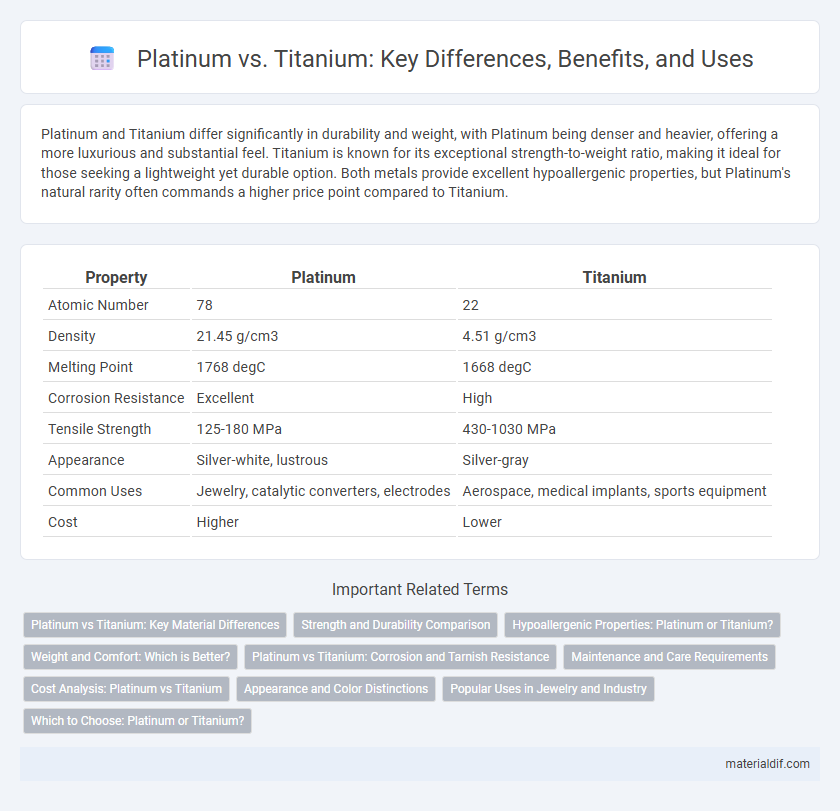Platinum and Titanium differ significantly in durability and weight, with Platinum being denser and heavier, offering a more luxurious and substantial feel. Titanium is known for its exceptional strength-to-weight ratio, making it ideal for those seeking a lightweight yet durable option. Both metals provide excellent hypoallergenic properties, but Platinum's natural rarity often commands a higher price point compared to Titanium.
Table of Comparison
| Property | Platinum | Titanium |
|---|---|---|
| Atomic Number | 78 | 22 |
| Density | 21.45 g/cm3 | 4.51 g/cm3 |
| Melting Point | 1768 degC | 1668 degC |
| Corrosion Resistance | Excellent | High |
| Tensile Strength | 125-180 MPa | 430-1030 MPa |
| Appearance | Silver-white, lustrous | Silver-gray |
| Common Uses | Jewelry, catalytic converters, electrodes | Aerospace, medical implants, sports equipment |
| Cost | Higher | Lower |
Platinum vs Titanium: Key Material Differences
Platinum exhibits superior corrosion resistance and density compared to titanium, making it ideal for high-end jewelry and industrial applications requiring durability and a lustrous finish. Titanium is significantly lighter, with excellent strength-to-weight ratio and biocompatibility, favoring aerospace, medical implants, and lightweight structural components. The choice between platinum and titanium hinges on specific application needs, balancing platinum's luxury and weight against titanium's strength and lightness.
Strength and Durability Comparison
Platinum exhibits greater density and malleability than titanium, resulting in superior resistance to deformation under pressure. Titanium, known for its high strength-to-weight ratio, offers excellent tensile strength while remaining significantly lighter than platinum. In terms of durability, platinum's resistance to corrosion and wear makes it ideal for long-lasting applications, whereas titanium excels in environments requiring lightweight, corrosion-resistant materials with high structural integrity.
Hypoallergenic Properties: Platinum or Titanium?
Platinum exhibits superior hypoallergenic properties due to its high purity and resistance to corrosion, making it an ideal choice for sensitive skin. Titanium, while also hypoallergenic, may cause reactions in rare cases due to alloyed metals used in its composition. Jewelry made from pure platinum ensures minimal risk of allergic reactions compared to titanium alloys.
Weight and Comfort: Which is Better?
Platinum is significantly denser and heavier than titanium, offering a luxurious and durable feel ideal for high-end jewelry. Titanium's lightweight properties make it exceptionally comfortable for everyday wear, especially for those seeking minimal wrist fatigue. Choosing between platinum and titanium depends on whether you prioritize the substantial weight and prestige of platinum or the featherlight comfort and flexibility of titanium.
Platinum vs Titanium: Corrosion and Tarnish Resistance
Platinum exhibits superior corrosion resistance compared to titanium, maintaining its luster and structural integrity in harsh environments without oxidizing. Titanium forms a protective oxide layer that enhances corrosion resistance but can dull over time, leading to surface discoloration and potential tarnishing. Platinum's inert nature ensures minimal chemical reactivity, making it ideal for applications requiring long-term durability and aesthetic appeal against corrosion and tarnish.
Maintenance and Care Requirements
Platinum requires less maintenance than titanium due to its naturally tarnish-resistant and durable properties, making it ideal for jewelry that retains its luster over time. Titanium, while lightweight and strong, can develop surface scratches more easily and may demand periodic polishing to maintain its appearance. Both metals are hypoallergenic, but platinum's denser composition offers greater resistance to wear and tear, reducing the frequency of professional cleaning and repairs.
Cost Analysis: Platinum vs Titanium
Platinum is significantly more expensive than titanium, with its price often exceeding $1,000 per ounce compared to titanium's market price around $5 per pound, reflecting the rarity and complex extraction process of platinum. Titanium offers a cost-effective alternative due to its lower material and manufacturing costs, making it ideal for applications requiring strength and corrosion resistance without the high expense. When evaluating cost-effectiveness, industries balance platinum's premium price against titanium's affordability, often choosing titanium for budget-sensitive projects and platinum where its unique properties justify the investment.
Appearance and Color Distinctions
Platinum exhibits a naturally white, lustrous finish that resists tarnishing and maintains its shine without plating, making it highly sought after for fine jewelry. In contrast, titanium has a darker grayish hue with a matte finish that can be anodized to display various colors but lacks platinum's classic elegance. The distinct visual appeal of platinum lies in its dense, brilliant shine, whereas titanium offers a modern, industrial look favored for its lightweight durability.
Popular Uses in Jewelry and Industry
Platinum's high density and natural white luster make it a preferred choice for fine jewelry, especially engagement rings and luxury watches, due to its hypoallergenic properties and resistance to tarnish. Titanium, known for its exceptional strength-to-weight ratio and corrosion resistance, is widely used in industry for aerospace components, medical implants, and lightweight jewelry designs targeting active lifestyles. Jewelry manufacturers favor platinum for its premium status and durability, while titanium's versatility and affordability cater to both industrial applications and modern, minimalist jewelry trends.
Which to Choose: Platinum or Titanium?
Platinum outperforms titanium in weight and durability, making it ideal for high-end jewelry that requires both elegance and resilience. Titanium's lightweight and hypoallergenic properties suit active lifestyles and people with sensitive skin. Choosing between platinum and titanium depends on the balance of luxury versus practicality, with platinum favored for premium, classic appeal and titanium for modern, durable wear.
Platinum vs Titanium Infographic

 materialdif.com
materialdif.com